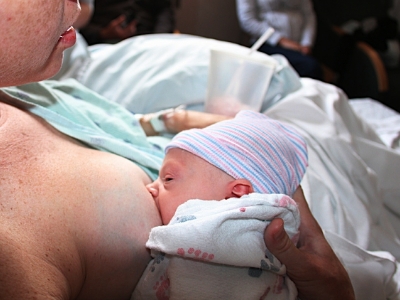How Long Is A Breastfeeding Session For A Newborn?
The breastfeeding session for a newborn depends on several factors. An average feeding may last 20 to 45 minutes during the newborn period. Newborn babies are often sleepy, so this length of time may need patience and persistence.
How To Know That Your Baby Is Hungry?

The best way to master breastfeeding is to nurse your baby when he or she seems hungry. There is no need to wait for tears. By then, your little ones may be uncomfortably hungry, especially if they cry for a long time. Even though your little ones are tiny, they will let you know what they need by:
- Opening their mouth
- Nuzzling against your breasts
- Making lip-smacking sounds
- Sucking furiously on that baby hand or your shirt, or your arm
- Sucking on the lip or tongue, which can look like sticking their tongue out
- Rooting, when a baby opens the mouth and turns the head to the side with the mouth open to find the food source, often after their cheek is stroked
- If your baby does cry, it will typically be a short, low-pitched wail that rises and falls
How Long To Breastfeed?
- Sessions typically last 20 to 45 minutes. Keep in mind, that’s on average. Your baby could take more or less time and need to feed for longer in the beginning and during growth spurts.
- Fully drain one breast. Preferably, at least one breast must be well-drained at every feeding. This is more important than being sure the baby feeds from both breasts. Wait until your baby seems ready to quit on breast one, then offer, but don’t force breast two. If the baby drains one breast and doesn’t want anymore, start with the other breast at the next feeding.
- Wait for your baby to signal. End the feeding by waiting for the baby to let go of the nipple. If your baby doesn’t, you’ll know to end the feeding when the suck-swallow pattern slows down to around four sucks per one swallow. Often, your baby will fall asleep at the end of the first breast and either awaken to nurse from the second or sleep through until the next feeding.

Factors That May Affect Breastfeeding Time
Some breastfeeding can take a full feeding in just 8 minutes. Others may need at least 20 minutes or more to get the same amount of breast milk.
Factors that influence the feeding time:
- Age: An older baby can typically get enough breast milk in a shorter period.
- Health: A premature baby or a baby born with a health issue may tire out easily while breastfeeding.
- Latch: A good latch helps a baby more effectively remove breast milk and therefore get a full feeding in less time.
- Alertness: A sleepy baby may not breastfeed as well or as fast as a baby who is awake and alert.
- Milk supply: If you have a low breast milk supply or your baby is going through a growth spurt, your baby may spend more time breastfeeding to try to get more breast milk.
- Flow: If your breast milk flows quickly and you have an active let-down reflex, there is more milk available for your baby right away.
The Benefits of Breastfeeding for Both Mother and Baby
Breastfeeding has health benefits for both the mother and baby. The nutrition and growth that breast milk provides to a baby are ideal for the development of the baby. The benefits of breastfeeding include protecting the baby and mother against certain illnesses.
Foods to Eat While Breastfeeding
Make healthy choices to fuel your milk production. Choose protein-rich foods, such as lean meat, eggs, dairy, beans, lentils, and seafood with low mercury levels. Fruits and vegetables, along with whole grains, should be included in your diet.
Breast milk will taste different if you eat a variety of foods while breastfeeding. As a result, your baby will be exposed to different tastes, which will make it easier for them to accept solid foods in the future.
You might need to continue taking a daily multivitamin and mineral supplement until your baby is weaned to ensure you and your baby are getting all the vitamins you need.

Benefits of Breastfeeding for the Mother
- Reducing her breast cancer risk.
- Reducing her ovarian cancer risk.
- Reducing her risk of developing osteoporosis.
- Burning calories and using mom’s fat stores for her breast milk.
- Producing oxytocin, which helps contract the uterus back to its pre-pregnancy size.
- Saving money, since breastfeeding is free.
- Lowering her chance of developing postpartum depression, since breastfeeding allows pregnancy hormones to reduce slowly, instead of abruptly.
Benefits of Breastfeeding for the Baby
Breast milk contains live immunity. When a baby consumes breast milk, they receive both immediate and lifelong immunities. Breast milk provides the specific nutrients that meet your baby’s needs.
Here are other benefits of breastfeeding:
- Can reduce your baby’s risk of sudden infant death syndrome (SIDS).
- Can reduce your baby’s risk of developing middle ear infections, allergies, and diabetes, since breast milk contains no artificial sugar.
- Allows babies to feel close to the home base that they’ve known while in the womb. Hearing your heartbeat and feeling your warm skin will help her transition from the inner world to the outer world.
- Docosahexaenoic acid (DHA), a polyunsaturated fatty acid found in breast milk, helps support proper brain development.
How Breastfeeding Can Be Challenging
The process of breastfeeding isn’t always easy. The process of learning this skill may take some time for new moms and babies. Breastfeeding is a new concept for many women of childbearing age, either because their mothers didn’t do it, or because other women in their lives didn’t do it either. There will be times when difficulties arise. After delivery, you’ll be exhausted and sore, and your baby will likely want to eat several times a night in the middle of the night for the first few weeks. The belly of your baby is about the size of a nickel.
The first couple of weeks is a time when the baby requires small, frequent feedings. Breastfed babies typically eat eight to twelve times in 24 hours. Lactation consultants can help you determine whether or not your baby is getting enough milk. Your milk production may seem inadequate at first, but it will increase.
Another time breastfeeding can be challenging is when your baby is not latching properly. A good latch means better milk transfer and less pain and discomfort for you. If you’re still experiencing nipple pain for more than two minutes into a feeding after two weeks of feeding, contact a board-certified lactation consultant for help.




